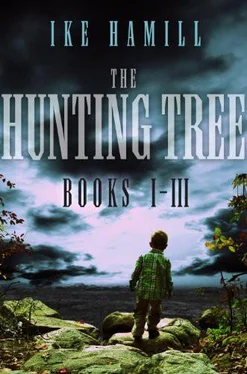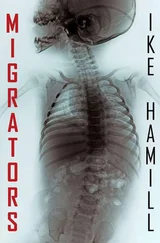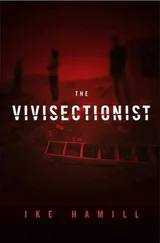“To what purpose? Isn’t that individual also infected?”
“Yes, but he never breeds. He prunes the dead branches of the genetic tree,” said Mike.
“Say what?” said Ken, surprised.
“This creature is born just to weed out the weak. A killer who’s skimming shallow end of the gene pool. Once every thousand generations a killer is born, and he’s somehow uniquely able to seek and destroy all the sick and weak members of his species. Cool, huh?”
“I guess,” said Ken. “So this thing would kill its own species. I’ve heard of that with chimps, killing rival troupes and things. Or lions that take over a pride will kill all the cubs.”
“Almost like that, but not exactly. Those are examples of animals who kill to increase the propagation of their own genes. The rogue is non-breeding. It acts on behalf of the whole species by only killing individuals with a genetic defect or communicable disease.”
“Weird,” said Ken. “But what benefit is there to the individual?”
“None,” said Mike. “It’s more like a hive mentality in that way. Doing the thing that’s best for the whole species so they don’t go extinct. It’s like a one-in-a-billion creature. It would only come out in the most dire of circumstances.”
“And you think that my patient is one of these rogue mutations?” asked Ken. “I don’t get it.”
“Nope, not at all,” said Mike. “The opposite, in fact.” He placed his empty beer glass near the edge of the table, to attract the attention of the waiter. “What have you told me about this kid? He’s good at sports, he’s developing early, he’s smart with a great memory, and he’s got heightened senses. This kid could be the perfect extinction vector. That would make him the target of the rogue.”
Ken chuckled at the assertion—“How so?”
“Take a look at the results when you get back to your desk. Look at the abnormalities I circled in his dad’s results and compare those to your kid. They’re nearly identical, and it’s nothing I’ve ever seen before. Then glance at what you thought was contamination in the mom’s sample. Why did everyone assume it’s a contamination?”
“Because it’s so out of place, and its clearly a duplicate from Davey’s results,” said Ken.
“Right,” said Mike. “But what if it’s not? What if the kid somehow infected his mom with that genome.”
“Like a retrovirus? Like HIV?”
“Exactly,” agreed Mike. “But this abnormality is accompanied by early puberty, above average intelligence and senses—so he’s better able to survive and thrive—likability, and, best of all, situational clumsiness.” Mike ticked off the attributes on his fingers.
“Why does the clumsiness help the disease?” asked Ken.
“Imagine that this thing can spread through blood contact. What better way to gain blood contact than a clumsy kid? People will sometimes shy away from a bleeding adult, but everyone runs to help a bleeding kid,” said Mike.
“That’s quite a theory,” said Ken. “So if I’ve got this straight, then this all starts with a terrible genetic defect that a whole group of people inherits.”
“Yup,” said Mike, “the whole tribe has it.”
“And they all commit suicide because they somehow realize that their existence threatens the whole species. But one of them survives, and he’s the perfect killer.”
“That’s right,” said Mike.
“But there’s also a kid. He’s a perfect extinction vector and the perfect killer wants to hunt the kid down?” asked Ken.
“Makes perfect sense from an evolutionary perspective,” said Mike.
Ken laughed. “How’s that?” he asked.
“Well, you’ve got to test the viability of the species somehow,” explained Mike. “Otherwise we’re just taking up space when the crows, or snakes, or trees should be taking over. You’ve got to think of the whole ecosystem as one big machine. Dinosaurs go and mammals come up. It’s all one big optimization. You can’t narrow your focus on just one species without thinking about what’s optimal for the whole planet. So, you get this perfect disease and a perfect cure and let them battle it out.”
Ken propped up his chin with his hand.
“What do you think?” asked Mike as the waiter brought over two plates of food.
“Two things,” said Ken. “First, you should stop drinking on an empty stomach. Second, I’m never letting you near any of my patients.”
The men laughed and dug into their food.
CHAPTER TWENTY-ONE
Crooked Tree - Present Day
THOUGHT RETURNED TO CROOKED TREE FIRST. His body knew instinctively to not breathe. Using the last energy in his muscles, he could draw a deep breath and flood his lungs with fresh oxygen, but that would bring quick death. His cells, confronted with a fresh supply of fuel after having been deprived so long, would explode—tearing themselves apart. He would die in a trillion tiny suicides.
None of that occurred consciously to Crooked Tree. His body handled the process of waking up, sipping fuel from the fresh air leaking into the cave, automatically. Crooked Tree’s ancient synapses awoke thinking only of the boy. This boy was more dangerous than any of his previous conquests. The boy had the power to destroy all families; his sickness would spread like raging fire.
As quickly as his consciousness returned, it began to fade. Crooked Tree drifted back to sleep.
* * *
THE NEXT TIME CROOKED TREE WOKE, almost a week later, he noted that his lungs had moved. He reached out with his mind and tried to sense the boy. It was difficult to locate his prey. The world around him seemed overcrowded with souls, packed into every corner. Sifting through all the competing voices, trying to find one particular boy, seemed too complex. He lay perfectly motionless—his body still recovering from its long slumber—when he felt his heart beat for the first time since his awakening. Fresh energy coursed through his core and then died away.
As his new vitality faded away, Crooked Tree realized his mistake. He couldn’t find the boy again because he had regained too much power. His perception had recovered to the point where he was sensing all the signals, not just the strongest. With his focus narrowed, trying to not reach out, he once again sensed the boy. His prey was asleep, dreaming of him, and far away—farther than Crooked Tree had ever roamed.
If Crooked Tree had regained control of his face, his next realization would have made him smile: the boy was undeveloped. His infection was immature, and not yet capable of spreading easily. This would give Crooked Tree time to find the boy and eliminate him before his disease could reach its full potential.
He felt his energy once again seeping away as his consciousness washed away.
* * *
CROOKED TREE SAT UPRIGHT and gasped, sucking in an enormous volume of air. He had felt minor bursts of energy since the last time he had been awake, but he had ignored them, sleeping and recovering. This time the power surge was too much, and although the air burned his lungs, he was alive.
He tried to blink in the near darkness, but one eyelid was sealed shut and the other glued open against a paper-dry cornea. His desiccated limbs creaked as he spun his body to find the source of the light. Over time, the rocks sealing his tomb had shifted or ground away, and he had a tiny window on dim stars, just big enough to fit his fist.
While he considered the hole, the starlight was blotted for a moment as a tiny bat streaked through the hole to return to its roost. His hand shot out on its own and plucked the squeaking creature from the air. He brought its flapping form up to his unmoving, unblinking eye and then scraped his bony thumb across its tiny neck, decapitating the little mammal with his slow swipe.
Читать дальше











